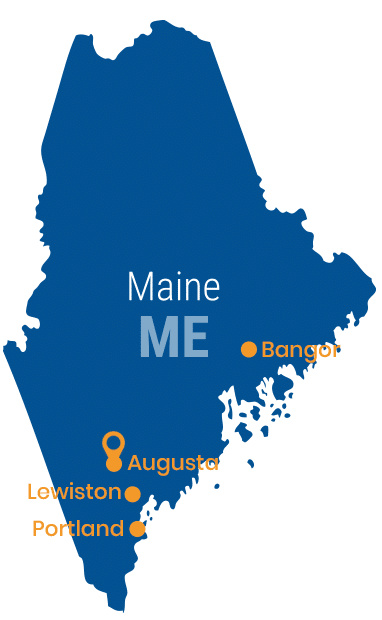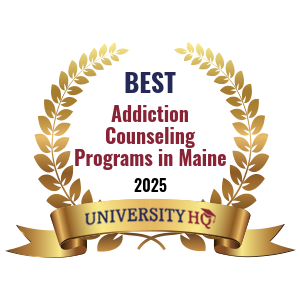What is Substance Abuse Counseling?
Addiction isn’t choosy, it will go after anyone. Regardless of age, race, gender, or socioeconomic background, anyone can find themselves in the grasp of alcohol or drug addiction and in need of help breaking free from it to be clean and sober again. Addiction counselors assist these people when they're ready to transition from the life of an addict. Although some careers might seem like they are more prone to addiction than others, there is no one particular industry where addiction counselors find people who need their help.
The top three industries in Maine are real estate, manufacturing, and business and finance. All three of these industries are extremely demanding and therefore many who work in these industries could find themselves coping in less than healthy ways. Addiction counselors can help these people find ways to still enjoy their careers without depending on harmful substances to get through the day. But children, teens, and even stay-at-home parents could find themselves mired by addition and in need of help.
In the state of Maine, there are 3,100 people employed as addiction counselors. On average, they start out earning around $36,000 a year, but income increases with additional education, experience, and licenses. According to the US Bureau of Labor Statistics, the need for counselors is expected to increase between now and the year 2030. If you are interested and helping people create a healthier life by beating an addiction, then this is a career you might want to consider. Below, you will find information regarding education requirements, licensing requirements, and jobs in the addiction counseling area.
An addiction counselor works with those who are in treatment for drug and/or alcohol addiction. Counselors work with both individuals and groups to help them identify their addiction triggers and create ways to avoid those triggers, as well as more healthy ways of dealing with life issues that might tempt them to return to using and abusing drugs or alcohol. Counselors create treatment plans for their clients and can work in treatment centers, outpatient clinics, agencies, or in private practice. There are several levels of addiction counselor licensure in Maine, and the levels are based mostly on education. Counselors work with a variety of people, from those who are in mandatory treatment to those who voluntarily sought treatment for recovery.

Top Ranked Campus & Online Addiction Counseling Programs in Maine
University of Maine at Augusta
Score: 90.77
- Undergraduate Tuition
- In-State: $8,618
- Out-of-State:$21,548
- Net Price: $11,569
- Acceptance Rate: 100%
- Retention Rate: 63%
- Graduation Rate: 23%
- Total Enrollment: 4,323
- Undergrad Students: 4,250
- Graduate Students: 73
- Grads Salary: $68,000
- Student-to-faculty: 15:1
Beal University
Score: 80.58
- Undergraduate Tuition
- In-State: $42,305
- Out-of-State:$42,305
- Net Price: $33,518
- Acceptance Rate: 100%
- Retention Rate: 50%
- Graduation Rate: 34%
- Total Enrollment: 520
- Undergrad Students: 512
- Graduate Students: 8
- Grads Salary: $64,000
- Student-to-faculty: 15:1
Eastern Maine Community College
Score: 75.21
- Undergraduate Tuition
- In-State: $3,877
- Out-of-State:$6,667
- Net Price: $9,972
- Acceptance Rate: 100%
- Retention Rate: 56%
- Graduation Rate: 33%
- Total Enrollment: 2,531
- Undergrad Students: 2,531
- Graduate Students: N/A
- Grads Salary: $35,600
- Student-to-faculty: 18:1
Southern Maine Community College
Score: 67.87
- Undergraduate Tuition
- In-State: $3,797
- Out-of-State:$6,677
- Net Price: $9,762
- Acceptance Rate: 100%
- Retention Rate: 59%
- Graduation Rate: 21%
- Total Enrollment: 7,205
- Undergrad Students: 7,205
- Graduate Students: N/A
- Grads Salary: $39,200
- Student-to-faculty: 19:1
Online Addiction Counseling Education in Maine
To reach the top level in the addiction counseling field in Maine, a doctorate degree is required. However, a person can hold various positions as a counselor without a PhD. Below are the degree options for a person who wants to work as a drug or alcohol counselor.
Online Associates (AS)
In the state of Maine, a two-year program can partially qualify a person to become an addiction counselor aide. More information about this is listed below.
In a substance abuse counseling associate program, students will take counseling courses such as the following:
- Assessment of Alcohol & Drug Addiction
- Introduction to Alcohol and Drug Counseling
- Professional, Legal, and Ethical Responsibilities for Alcohol & Drug Counselors
- Special Topics for Alcohol & Drug Counseling
- Treatment Planning & Relapse Prevention for Alcohol & Drug Addiction
Online Bachelors (BS)
Students that choose to pursue a bachelor’s degree in addiction counseling will study sociology, psychology, and also liberal arts classes to cover the required general education. Students will also study chemistry and biology because this adds vital educational information about how drug addiction could change the chemical composition of a person's brain. Other classes in an addiction counseling program could include the following, though it will depend on the school/program you choose.
- General Psychology
- Behavioral Psychology
- Clinical Psychology
- Human Development
- Counseling
- Sociology
Students may also have to complete a critical internship in their desired area of study. The internship can take place in any type of facility provided they are approved to offer training to interns. This means a licensed therapist must be involved in the training process.
Online Masters (MS)
The most common substance abuse counseling master’s degrees are for people who want to work as addiction counselors are those in social work and psychology. Addiction counseling is a component of both programs, but there is also a two-year certificate that can be included in the curriculum. Along with the courses in psychology and social work, students may take some of these courses.
- Building Your Ideal Private Practice
- Human Growth and Development
- Orientation to Addiction
- Psychopathology and Personality Disorders
- Social and Cultural Foundations of Counseling
Students who are not currently working in a counselor role will have to complete an internship. It can be completed through an organization or through individual, private practice or at a local healthcare facility. The program typically takes three to five years to complete. A capstone or a comprehensive examination might be required.
Online Doctorate (PhD)
Addiction counseling is usually part of a clinical PhD program. Students will study classes such as abnormal psychology, human development, clinical psychology, and behavioral science. A person with a doctorate and a license can offer internships to other students and are qualified to teach at the university level. To complete one of these programs, a dissertation is required as is its successful defense. You may also be able to find a program with access to a clinical internship, which must be completed under the supervision of a licensed supervisor and must include face to face counseling with patients. Current applicable work experience can be substituted.
Become a Substance Abuse Counselor in Maine
Although you can start a career in addiction counseling without a bachelor's degree, it’s advised that those who want to progress in the field should attain a four-year degree in a psychology or social science field (psychology, social work, sociology, etc.). Once a person has attained this education, there are four levels of addiction counselors in Maine, all of which are required to pass an exam and apply for licensure.
Find Online Substance Abuse Counseling Schools
- Alcohol and Drug Counseling Aide –
This professional is licensed by the Board of Alcohol & Drug Counselors to engage in an apprenticeship for the purpose of acquiring the require knowledge and experience in the drug and alcohol counseling area.
Aides may perform the following tasks:
- Facilitate individual and direct group counseling
- Perform other duties under the direct supervision of a certified clinical supervisor
After passing the ADCA exam, a person can apply for an Alcohol and Drug Counseling Aide license.
- Certified Alcohol and Drug Counselor –
This is a professional who can provide individual and group drug and alcohol counseling services unaided. They cannot, however, engage in private or independent practice. They must work under a certified clinical supervisor within an agency. Upon passing the CADC exam, a person is eligible to apply for the Certified Alcohol and Drug Counselor license. - Licensed Alcohol and Drug Counselor –
This is a professional who can provide individual and group alcohol and drug counseling services either independently or within an agency or private practice. An LADC can also assume supervisory duties upon attaining a certified clinical supervisor license. Upon passing the LADC exam, a person can apply for the Licensed Alcohol and Drug Counselor license (needed before getting the clinical supervisor license). - Certified Clinical Supervisor –
This professional is licensed by the board to provide clinical services including counseling for drug and alcohol for both individuals and groups. They are also certified to provide clinical supervision to other licensed alcohol and drug counselors. The have the authority to approve and review treatment plans and counseling activities created by other drug and alcohol counselors. They can practice individually within an agency setting or go into private practice.
As the list suggests, the certifications and licenses are typically completed in the above order. But some counselors might choose to go in a different counseling direction. For people who might be interested in other counseling careers, this is why coupling addiction counseling with another discipline like social work or psychology is worth considering.
Careers for Addiction Studies Graduates
Counselors are used in a variety of settings and work with people of all ages. Below are some of the careers a person with an education in addiction counseling might consider. This is far from an exhaustive list, but here are some of the more common positions a person might hold.
- School Counselor
School counselors work in an educational setting such as a school and help students with their various needs. Counselors offer some students general counseling in how to deal with classmates and homework, while other students need additional emotional support. School counselors may evaluate students and make recommendations where necessary. - Clinical Social Worker
Clinical social workers are trained to evaluate a situation and determine where additional needs should be met. They take this information and match the needs to the proper organization that can assist. Clinical social workers work with people will of all ages, but many will specialize in adults, children, veterans, the elderly etc. Some clinical social workers are also licensed addiction counselors. - Adult and Geriatric Counselor
Adult and geriatric counselors work with adults and elderly people. They are trained in the special needs these groups might have. These counselors work in private practice or with local social service agencies and can also can be found in nursing homes and rehabilitation centers. - Sports Psychologist
Sports psychologists study how sports can affect its participants, both positively and negatively. They also help athletes learn to deal with the elements of competing as an athlete. - Grief Counselor
Grief counselors assist with the process of dealing with grief. Counseling sessions can be in a group or on an individual basis. These counselors help people process their grief in healthy ways so that it does not lead to other issues, such as substance abuse. - Group Counselor or Therapist
Counseling and therapy are the more common professions for people working in the addiction counseling field. Therapy professionals can assist people with addiction issues, as well as other problems a person might be experiencing. Group counselors tend to work with their clients in a group setting, so in some cases, the counselor works as a facilitator, ensuring that the conversation within the group remains on topic and that any exercises assigned to the group are completed correctly. - Child Counselor
Child counselors specialize in assisting mentally distressed children who might be experiencing emotional or behavioral issues. Child counselors are specially trained to assist children because they might not be capable of expression their feelings and, therefore, counselors may have to use different approaches to help them.
Search All Programs





